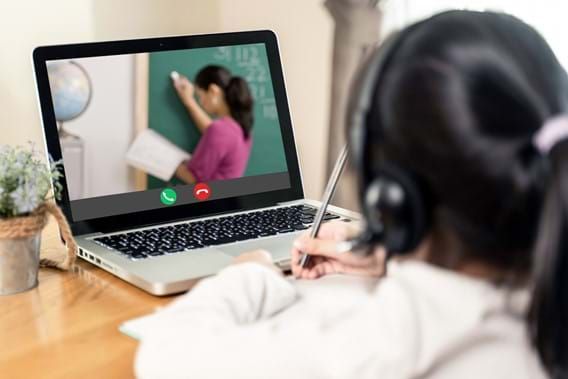
Adapting to Online Learning

Written by: Optima Santé globale
Due to the pandemic, many students were forced to make an abrupt transition to online learning. For CEGEP and university students, it’s the only option, but many primary and secondary school students are also having to cope with the shift to full- or part-time online learning. How are young people being impacted by this sudden change? And what can parents do to support the mental health of their children?
Though online learning is the best way to prevent the spread of COVID-19 in schools, it comes with its share of challenges. Luckily, there are some tips for navigating these uncharted waters.
Anxiety and Loss of Motivation
Though virtual classes often follow a strict schedule, there is less structure than in a traditional classroom setting. As a result, students might feel a little bit lost. As they navigate this unfamiliar territory, they may also experience a loss of motivation that can cause anxiety and negatively impact their mood and their grades. In these moments, they need our attention and support more than ever.
Potential Solutions
- Stick as closely as possible to your usual family routine or set a new one to help your kids feel secure. Get up and go to bed at the same time every day, eat meals together, ask your kids to get dressed like they normally would for school, etc. The Government of Canada also recommends getting your kids involved in setting a routine and making household rules to help build their confidence.
- Help your children with their learning as much as possible: answer their questions and regularly check in to be sure they understand the day’s lessons.
- Acknowledge their hard work and celebrate their successes.
- Remain receptive, open and reassuring.
Excessive Screen Time
Kids and teens have their eyes glued to their screens all day long. They watch educational videos, use apps to do assignments, search the web, view digital documents and take online tests. Even their meetings with teachers are done online, via video conference.
After school, many kids and teens unwind by spending time on social networks, watching TV or playing video games. The World Health Organization (WHO) has found that isolation and restrictions make it even more tempting to spend time in front of screens.
Potential Solutions
- Remind your kids to take regular breaks when they’re working on a computer or a tablet. Doing some stretches, eating a snack standing up at the counter, and taking the dog out for a walk are all good ideas.
- Encourage your children to get involved in activities that stimulate their creativity, like board games, drawing, doing crafts, gardening and cooking. Or sing and dance just for the fun of it!
- Encourage them to take up a physical activity they enjoy, either on their own or with the rest of the family. There are tons of options you can easily do without a specialized facility, indoors and out, winter or summer: boot hockey, running, circuit training, yoga, etc. Be creative!
Lack of Human Contact and Isolation
Kids and teens miss being around their friends. With online learning, communication is often limited to student-teacher interactions, so students miss out on chatting with their friends in class. According to the website Naître et grandir, students also miss the physical contact, like hugs, that they would normally get from their friends while playing or at recess. In addition, online learning deprives them of the opportunity to develop certain social skills (conflict resolution, for example).
Potential Solutions
- Be affectionate: give your children lots of hugs and cuddles. If they’re more independent, go for high fives, a pat on the back or another form of encouraging or reassuring physical contact.
- Regularly join in on activities with your kids (either all together or one-on-one).
- If your children are not in quarantine or isolation, let them see their friends outside while staying two metres apart.
- Encourage them to stay in touch with friends and family members they are close to (online or over the phone).
Professional help is also available. For example, families with a Kaleido RESP have access to Accompanying Services offered by quality partners. Check it out today!
Sources: World Health Organization, Government of Canada and Naître et grandir (French only).


